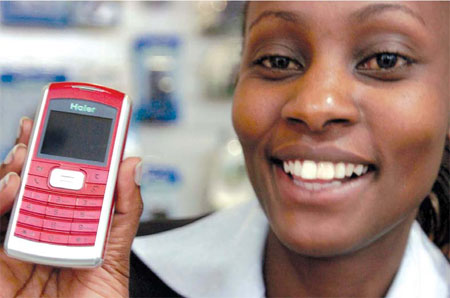Chinese manufacturers feel their way in African market
Passengers leaving the airport in Johannesburg, one of Africa's busiest hubs, can see a long billboard near the baggage-claim area: "New choice, new life. Haier-inspired living."
Haier, a widely known Chinese brand of home electronics and appliances, has entered Africa as part of a long-range strategy to compete with other international manufacturers in the global marketplace.
Comment about China's engagement with Africa, now a subject of international attention, has in the past tended to focus on the country's involvement in infrastructure - the construction of roads, bridges, dams, stadiums and harbors. Claims have circulated, as well, that China's interest in Africa is mainly about access to the continent's natural resources.
Such perceptions have overshadowed China's other development work, especially in the manufacturing sector. And manufacturing is something Africa's emerging nations desperately need.
Contrary to myth, China's engagement with Africa is diversified, according to a recent report. The report - Survey Concerning Outbound Investment by Chinese Business in 2013 - was issued last month by the China Council for the Promotion of International Trade.

It shows that while State-owned enterprises are still the main players in Chinese outbound investment - with those businesses likely to go to North America and the European Union region, Chinese investment in Africa is mostly concentrated in the manufacturing sector, debunking the notion of skewed interest in the continent's natural resources.
The report said manufacturing accounts for more than 30 percent of all Chinese investment in sub-Saharan Africa, nearly double the investment in the mining sector.
Haier is not the only company that is localizing its commercial strategy in Africa. One competitor, Hisense, also from China, put a factory in South Africa more than 10 years ago.
Hisense may not have the bigger market share in China or other parts of the world, but its share in South Africa over the past decade has blossomed to nearly 20 percent, and is still growing. The company seeks to expand its business in other parts of Africa and increase its number of factories.
The moving of factories into Africa to be closer to raw materials is a positive trend that appeals to investors. It brings them closer to emerging markets that have vast potential for consumption in the not-so-distant future.
More important, technology and skills transfers, along with local job creation, are keys to sustainable development for Chinese manufacturers - a theme revisited often by former chief economist of the World Bank Justin Yifu Lin.
A closer look at the manufacturing scene in Africa reveals that, in addition to giant manufacturers from China, there are also increasing numbers of medium-size investors - and developing ones - which signals a good start for modernization and transformation. Labor- and raw-materials costs to Chinese firms will be greatly reduced, while a more developed African marketplace will provide more opportunities for Chinese business returns.
Again, this is not a solo effort by the Chinese. Sustainable progress will require cooperative efforts, without which the invisible costs of bringing factories to Africa - for instance, low educational backgrounds and social security risks - could cause investments to fail in the long term.
It is interesting to note that although Chinese engagement with Africa has been booming for more than a decade, many things are just beginning, particularly in manufacturing.
Despite this promising news, some small- and medium-scale Chinese manufacturers in Africa shy away from media exposure. They say it is too difficult for them to relate valuable stories or share experiences right now because they are still in an experimental phase, with a long way to go before they can say for sure that moving factories and branding products in Africa was smart strategy.
An old Chinese saying may appropriately describe the situation: They are "wading across the stream by feeling the way".
Contact the writer at lilianxing@chinadaily.com.cn
|
A sales assistant shows a cell phone made by Haier, a widely known Chinese brand, in Nairobi, Kenya, in 2005. More and more products with the "Made in China" label, from shoe polish to trucks, have become part of daily life in Africa. Provided by Xinhua |
(China Daily 11/19/2013 page10)















